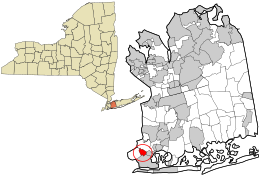Cedarhurst, New York
| Cedarhurst, New York | |
|---|---|
| Village | |
| Incorporated Village of Cedarhurst | |
 Location in Nassau County and the state of New York. |
|
| Location within the state of New York | |
| Coordinates: 40°37′33″N 73°43′42″W / 40.62583°N 73.72833°WCoordinates: 40°37′33″N 73°43′42″W / 40.62583°N 73.72833°W | |
| Country |
|
| State |
|
| County | Nassau |
| Government | |
| • Mayor | Benjamin Weinstock |
| Area | |
| • Total | 0.7 sq mi (1.8 km2) |
| • Land | 0.7 sq mi (1.8 km2) |
| • Water | 0.0 sq mi (0.0 km2) |
| Elevation | 26 ft (8 m) |
| Population (2010) | |
| • Total | 6,592 |
| • Density | 9,400/sq mi (3,700/km2) |
| Time zone | Eastern (EST) (UTC-5) |
| • Summer (DST) | EDT (UTC-4) |
| ZIP code | 11516 |
| Area code(s) | 516 |
| FIPS code | 36-13233 |
| GNIS feature ID | 0946156 |
| Website | www |
Cedarhurst is a village in Nassau County, on the South Shore of Long Island, New York, in the USA. The population was 6,592 at the 2010 United States Census. The village is named after a grove of trees that once stood at the post office.
The Incorporated Village of Cedarhurst is in the town of Hempstead. Cedarhurst is represented on the Board of the Town of Hempstead by Councilman Bruce Blakeman.
The village was incorporated in 1910. It is part of the "Five Towns", together with the village of Lawrence and the hamlets of Woodmere and Inwood, and "The Hewletts", which consist of the villages of Hewlett Bay Park, Hewlett Harbor and Hewlett Neck and the hamlet of Hewlett, along with Woodsburgh.
Cedarhurst's early name was Ocean Point. Rail service arrived in 1869 which led people to the area, especially to the Rockaway Hunting Club, built in Cedarhurst in 1878. A post office was established in 1884, and Ocean Point was renamed Cedarhurst, partly at the request of the Hunt Club.
For many years, Central Avenue, the area's main business district, was considered the Rodeo Drive of Long Island, offering upscale shops and boutiques to discriminating shoppers from around the area. With the growth of the local Orthodox Jewish community, many stores and restaurants now cater to the needs of this community. As observant Jews do not shop on the Jewish Sabbath, many of the street's businesses are closed on Saturday, reducing the foot traffic for those stores that remain open on Saturdays.
...
Wikipedia


